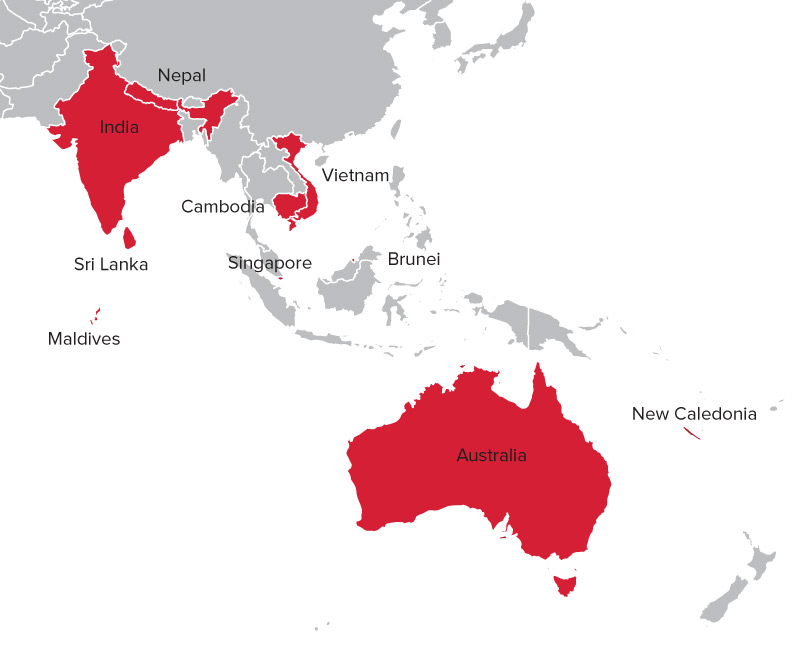Back to Flight Inspection
Flight inspection in Australia and Asia

AeroPearl uses aircraft to help countries meet a variety of regulations
Across the globe, pilots flying in and out of international and regional airports rely on a collection of communications, navigation and surveillance systems to operate safely. The crews and technicians who ensure those systems are working properly are pilots and passengers themselves, because its aircraft equipped with sophisticated flight inspection technology that measure and calibrate the airways.
AeroPearl’s crews fly in one of three Beechcraft® King Air® 350 turboprops to help keep civil and military navigational aids on track. Since 1997, the Brisbane-based company has provided flight inspection services for Airservices Australia, a government-owned corporation that oversees the country’s airspace.

In addition to the Middle East and French Polynesia, AeroPearl also serves Australia, Singapore, Cambodia, Vietnam, New Caledonia, Brunei, Nepal and India, The Maldives and Sri Lanka.
Today, AeroPearl goes beyond Australia’s borders, conducting routine flight inspections in several countries throughout Asia, including Singapore, Cambodia and Vietnam, as well as the French islands of New Caledonia and French Polynesia that lie east of Australia. Other flight services missions have taken the company to Brunei, Nepal, India, The Maldives, Sri Lanka and the Middle East.
“Our missions take us to all different regions: the southern coastal regions of Australia, the desert around Alice Springs in Central Australia, tropical places such as Darwin, Cairns or Singapore, and all the way to the mountains of the Himalayas,” said Thomas Schachtner, business development manager for AeroPearl.
AeroPearl is a joint venture between the Australian Paspaley Pearls Group, producers and suppliers of South Sea pearls, and Germany’s Aerodata, experts in Flight Inspection Systems and special mission aircraft modifications.
The company utilizes two King Air 350i aircraft and one King Air 350 equipped with fixed installations of Aerodata’s AeroFIS Automatic Flight Inspection System. The system includes onboard satellite communications, which help support the crew’s tasks and offer easier mission management from AeroPearl’s home base in Brisbane.
AeroPearl’s three King Air turboprops fly a combined total of more than 1,200 hours every year
“We place a high level of importance on redundant systems, both in the primary avionics, as well as in the flight inspection equipment. A great feature is the autopilot coupling of the flight inspection equipment with a digital map for the flight crew. This reduces workload in a safety-sensitive environment, enhances crew coordination and improves the accuracy of the flight profiles,” said Mr. Schachtner.
The aircraft are often dispatched on long and remote deployments. The flight inspection missions last from one to eight weeks with new crews swapped in every two weeks.
“On a typical mission, we often complete the navaids at an airfield in the morning and then position the aircraft at the next airport in the afternoon. The traffic at airports such as Sydney requires calibration on weekends, and the navaids at Singapore Changi Airport are calibrated at night,” said Mr. Schachtner.
Some 25 specialists support the flight inspection missions. A network of sister companies and other partners provide AeroPearl access to ancillary facilities wherever needed.
“The aircraft perform well and efficiently, both at low-level and at higher altitudes. They are fast enough during the approach so as to avoid unnecessary loss of landing slots, and they can quickly climb and turn after completion of a measurement run if required.”Terry Flynn, general manager for AeroPearl
For AeroPearl, operating in and from Australia presents special challenges. The continent is vast with a relatively small population and few airfields.
“The King Air performs very well to cross those distances without compromising efficiency at low level. Over the past 15 years, it has proven to cope with the heat and humidity, too,” said Terry Flynn, general manager for AeroPearl.
“In short, the King Air 350 offers us all we could ask for in a flight inspection aircraft. Its payload, range and speed envelope match the flight inspection mission very nicely. The fuselage offers plenty of area for antenna installations, and the pressurized, quiet cabin provides a good work environment for our flight inspectors.”
To view all of our special missions aircraft visit
http://specialmissions.txtav.com